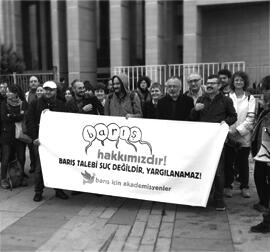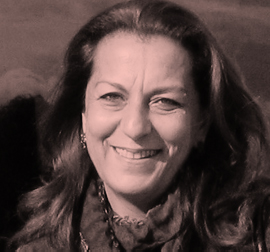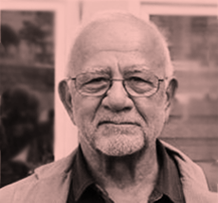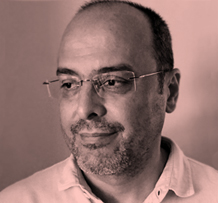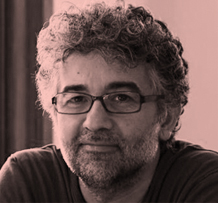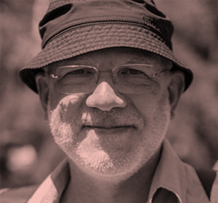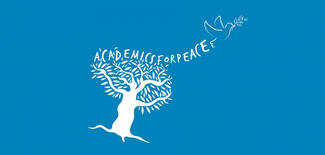On January 10, 2016, 1128 academics from 89 universities held a press conference announcing that they signed “We will not be party to this crime!” petition. The statement called to end the violence exerted on people during the curfew declared in Kurdish provinces following the fighting that broke out and to start a conflict resolution process to ensure durable peace. The following week, there were 2212 signatories of the petition. Hundreds of academics were removed from their posts and lost their jobs; their passports were confiscated. Many of them were barred from finding other jobs, threatened and survived attacks, called to the police station many times and were shown as a target. Lawsuits were filed individually against them. Although the Constitutional Court decided that the lawsuits brought against the academics were “in violation of their rights” succeeded by verdicts of acquittals of most academics, 88% of them are not returned to their posts.
Academics for Peace was founded in November 2012 in the aftermath of a statement that supported Kurdish prisoners’ demands for peace in Turkey, which they voiced through a hunger-strike. The statement was signed by 264 academics from over 50 universities. However today, what is known as the Academics for Peace are the signatories of the petition “We will not be a party to this crime!” which was publicized in January 2016.
The petition was released through a press conference on January 11, 2016. Tens of academics were taken under custody, suspended from their posts, and faced legal and procedural investigations starting from January 15. Over 300 journalists, 400 filmmakers and 500 authors stood in solidarity with the academics undergoing investigation. An investigation for “Praising an Offence and Offender” was launched against 433 filmmakers who released a solidarity statement.
“We will not be a party to this crime!” petition was presented to the Grand National Assembly of Turkey (TBMM) on January 21, 2016 with 2212 signatures. The file presented included 2215 signatures of academics and researchers from abroad in solidarity with the petitioners.
On March 10, 2016 an order to arrest the 4 academics who held the press conference was issued. These academics’ houses were raided on March 14. 3 academics (Esra Mungan, Muzaffer Kaya, Kıvanç Ersoy) went to the police department at their own will. They were arrested by the court order on March 15, 2016 on the grounds that “We will not be a party to this crime!” statement was judged to be “making propaganda for a terrorist organization”. Meral Camcı, who had been abroad as the custody order was issued, had returned to Turkey remarking “I will stand behind my words of peace and will keep on struggling”. The academic who had gone to the police department on March 31 and was arrested.
These four academics appeared before judge on April 22, 2016 and were released. Upon the prosecutor’s request, the Ministry of Justice allowed for academics to be charged with Article 301 of the Turkish Penal Code (TCK), which regulates the crimes of “insulting Turkish nation, government of Republic of Turkey, and Turkish state”. The four academics were acquitted from this charge on September 30, 2019.
The academics who are signatories to the petition are being charged with “Making Propaganda for a Terrorist Organisation”, based on the Article 7/2 of the Turkish Anti-Terror Act No. 3713. The first case was heard at the court on December 5, 2017 in Caglayan, Istanbul.
The General Assembly of the Constitutional Court (AYM) examined the individual applications of 10 Academics for Peace. On July 26, 2019, the Court ruled that the penalization of Academics for Peace on charge of “terror propaganda” has violated their freedom of expression and changed the fate of the hearings.
The first verdict of acquittal was given on September 6, 2019. By October 19, 2020 a total of 622 academics were acquitted.
Human Rights Foundation of Turkey (TİHV) launched its report on Academics for Peace on August 27, 2020. According to the report, following the lifting of the emergency law on July 20, 2018, a number of Academics for Peace who have been removed from their posts filed lawsuits in request for a stay in execution at the administrative courts on the basis that “decree laws instated during the emergency law cannot legally continue to be executed after the lifting of the emergency law”.
The cases were rejected despite the Council of State and AYM jurisprudence. The decision as to whether Academics for Peace will be reinstated to their posts is left to the Commission for the Examination of Proceedings Under the State of Emergency. Among academics who have applied for a passport, there are a number of people who did not receive a formal reply from the authorities within the legal timeframe, and those who have been rejected.
As of June 2023, many academics, who were dismissed, are not recruited by universities despite the reinstatement decisions of the courts.
While some courts reject the applications of academics, some universities apply to the higher court against the reemployment decision of the courts. While the courts of appeal upheld the decisions of seven academics until 12 June 2023, they gave a stay of execution in the decision of seven academics. While the academics, who have been given a stay of execution decision, are dismissed from the university again, the appeal processes continue.
